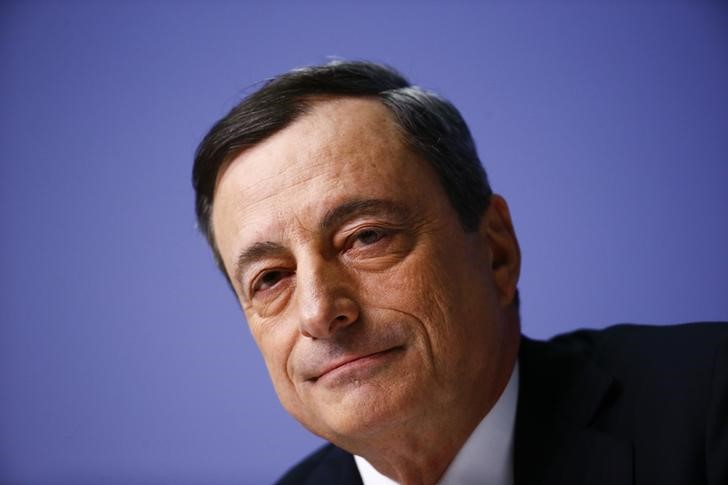(Adds close of European bond, stock markets)
* Wall St falls, dragged by energy, materials shares
* Commodities slide sharply on weak world demand
* US-German 5-year bond yield spread widest since 1999
By David Gaffen and Herbert Lash
NEW YORK, Nov 12 (Reuters) - U.S. and European government
bond yields dropped on Thursday on indications of further
monetary policy stimulus by the European Central Bank, while
stocks fell, led by sectors most influenced by weak global
demand trends.
The dollar had rallied against the euro after remarks by ECB
head Mario Draghi, who warned that price inflation, a key
measure of economic health, was lagging.
But the currency markets shifted after St. Louis Fed
President James Bullard, generally a more hawkish member of the
U.S. central bank, suggested industrial nations may be headed
into an era of permanently low rates.
"Should we find ourselves in a persistent state of low
nominal interest rates and low inflation, some of our
fundamental assumptions about how U.S. monetary policy works may
have to be altered," Bullard said in prepared remarks.
That drove buying in the U.S. Treasury market, where yields
have been steadily rising in anticipation of a Fed rate increase
in December. Losses on Wall Street stocks revived safe-haven
demand for government debt.
Bullard's comments come on a day when several Federal
Reserve members, including New York Fed President William
Dudley, are scheduled to speak. He said the policy-setting
Federal Open Market Committee needed to "think carefully" about
whether the time was right to begin tightening monetary policy.
OIL DROPS
The dollar's recent gains have helped push crude oil to lows
not seen since late August and copper to a six-year low.
Oil was down again Thursday, with crude prices dropping more
than 2 percent. U.S. crude CLc1 fell $1.09 to $41.84 a barrel,
and Brent crude LCOc1 slipped $1.31 to $44.51 a barrel.
Weak global demand has sapped interest in commodity markets.
The U.S. stock market also fell, dragged by energy and
materials shares which were directly affected by global demand.
The MSCI all-country world index .MIWD00000PUS lost 0.66
percent, with the heaviest losses in European shares. The
pan-European FTSEuroFirst 300 .FTEU3 closed down 1.61 percent
at 1,470.05 points.
The Dow Jones industrial average .DJI fell 163.45 points,
or 0.92 percent, to 17,538.77. The S&P 500 .SPX dropped 14.6
points, or 0.7 percent, to 2,060.4 and the Nasdaq Composite
.IXIC lost 19.63 points, or 0.39 percent, to 5,047.39.
Copper futures in London hit a 6-year low of $4,800 a tonne
CMCU3 and platinum hit its lowest since late 2008 at $868.75
an ounce XPT= .
POLICY DIVERGENCE
In an address to the European Parliament, Draghi said
inflation dynamics had somewhat weakened and a "sustained
normalization" of inflation could take longer to achieve than
thought.
"Although the debate at the ECB seems to be far from over,
the fact that Draghi made these comments in a high-profile
setting suggests that he is confident that the majority of the
ECB council will support him," said Holger Schmieding, chief
economist at Berenberg Bank in London.
German 10-year yields rose 2 basis points to 0.607 percent
DE10YT=TWEB . All other euro zone yields were down on the day.
Expectations for ECB easing are in sharp contrast to those
for U.S. monetary policy. Most investors are betting that last
Friday's stellar U.S. employment report has set the seal on the
Federal Reserve raising rates at its meeting next month.
Illustrating that divergence, the gap between U.S.
US5YT=RR and German five-year yields DE5YT=RR rose to 181
basis points at one point, the highest since 1999.
The dollar index .DXY , which tracks the greenback against
a basket of six major currencies, fell 0.23 percent to 98.784.
The euro EUR= rose 0.22 percent to 1.0743, while the yen
JPY= fell 0.02 percent to 122.82.
(Editing by Nick Zieminski and Bernadette Baum)
